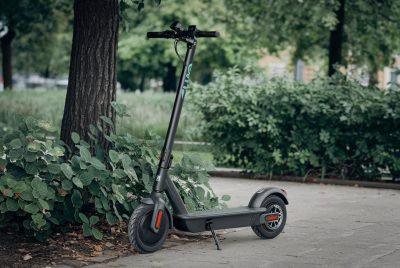Sustainable transport: What is it and why is it important?
*We may earn a commission for purchases made using our links. Please see our disclosure to learn more.
As an enthusiastic advocate for sustainable transportation, my journey with electric scooters has opened my eyes to the importance of eco-friendly commuting methods. In this article, I will delve deeper into the world of sustainable transport, offering a comprehensive exploration of what it is and why it is crucial for our planet’s well-being.
Defining Sustainable Transport
To truly understand the essence of sustainable transport, it is essential to define it comprehensively. Sustainable transport encompasses various modes of transportation designed to have minimal negative impacts on the environment, society, and the economy. At its core, it is about finding innovative ways to move people and goods while simultaneously reducing carbon emissions, conserving valuable resources, and promoting social equity.
The Environmental Impact
Reducing Carbon Emissions
One of the most significant reasons why sustainable transport matters is its positive impact on reducing carbon emissions. Traditional gasoline-powered vehicles are major contributors to greenhouse gases, which contribute to climate change. In contrast, electric scooters and other sustainable modes of transport are powered by electricity or cleaner energy sources, significantly lowering their carbon footprint.
Mitigating Air Pollution
Sustainable transport also plays a vital role in mitigating air pollution. Urban areas often suffer from poor air quality due to vehicle emissions. By embracing electric scooters and other eco-friendly options, we can breathe cleaner air and improve the health of our communities.
The Economic Benefits
Cost Savings
Sustainable transport isn’t just good for the environment; it’s also a smart financial choice. Electric scooters and public transit systems are often more cost-efficient than owning and maintaining a personal vehicle. When we save money on transportation, we have more resources for other important aspects of our lives.
Job Creation
Investing in sustainable transport can also boost the economy by creating jobs. From manufacturing electric scooters to maintaining public transit infrastructure, these initiatives generate employment opportunities, contributing to local and national economies.
The Social Impact

Improved Public Health
Choosing sustainable transportation options can lead to improved public health. Reduced air pollution means fewer respiratory problems, and increased physical activity, such as cycling, can promote overall well-being. A healthier population benefits everyone.
Enhanced Mobility
Sustainable transport provides more accessible mobility options for everyone, including those who can’t afford a personal vehicle. Public transit, shared bicycles, and electric scooters expand transportation choices and promote inclusivity.
Sustainable Transport Options
Now that we have a profound understanding of the importance of sustainable transport, let’s explore some of the options available in greater detail.
Electric Scooters
Electric scooters have gained substantial popularity in recent years, and for a good reason. They offer a convenient, efficient, and eco-friendly mode of transportation, particularly suited for covering short distances in urban areas. Equipped with electric motors and rechargeable batteries, electric scooters emit zero tailpipe emissions and produce minimal noise pollution.
These two-wheeled marvels are designed for urban mobility, allowing users to navigate through congested city streets with ease. They are cost-effective, require minimal maintenance, and can be easily rented through smartphone apps, making them an accessible choice for eco-conscious commuters.
Public Transit
Public transit systems, including buses, trams, and trains, constitute the backbone of sustainable urban transportation. They are capable of carrying a large number of passengers, reducing the need for individual cars and alleviating traffic congestion.
Public transit has the advantage of being a collective mode of transportation, making it energy-efficient and environmentally friendly. Moreover, it provides an affordable and convenient option for daily commuting, especially in densely populated urban areas.
Bicycles
Bicycles are among the oldest and most sustainable modes of transportation known to humanity. They produce zero emissions, require no fuel, and promote physical activity—a win-win for both individuals and the environment.
Many cities are recognizing the importance of cycling as a sustainable transport option and are investing in dedicated bike lanes and bike-sharing programs. These initiatives encourage more people to embrace cycling as a viable mode of daily transportation.
Carpooling
Carpooling involves sharing a ride with others, reducing the number of vehicles on the road and decreasing traffic congestion. It is a cost-effective and eco-friendly way to travel, especially for longer distances.
Carpooling initiatives can be facilitated through ridesharing apps or coordinated with coworkers and friends. By sharing the cost of fuel and reducing the number of vehicles on the road, carpooling not only benefits the environment but also offers potential cost savings for participants.
Overcoming Challenges
While the benefits of sustainable transport are clear, there are challenges to overcome to achieve widespread adoption.
Infrastructure
Supporting sustainable transport options requires the development of appropriate infrastructure. This includes creating bike lanes, establishing charging stations for electric scooters and cars, and maintaining efficient public transit systems.
Investment in infrastructure is crucial for the success of sustainable transport. Governments and municipalities must allocate resources to build the necessary infrastructure, ensuring that sustainable options are accessible and reliable for all.
Behavioral Change
Encouraging people to embrace sustainable transport options often requires a fundamental shift in behavior and mindset. Many individuals are accustomed to the convenience of personal vehicles and may be resistant to change.
However, education and awareness campaigns, along with incentives, can play a pivotal role in promoting behavioral change. People need to understand the benefits of sustainable transport and feel motivated to make the switch.
Government Initiatives
Governments play a pivotal role in driving the adoption of sustainable transport solutions.
Incentives and Regulations
Many governments offer incentives to promote the use of sustainable transportation. These incentives may include subsidies for electric vehicle purchases, tax breaks, and reduced registration fees for eco-friendly vehicles.
Simultaneously, governments implement regulations and standards to ensure the safety and reliability of sustainable transport options. These regulations may cover vehicle emissions, safety standards, and infrastructure development.
Investment in Infrastructure
Governments must invest in transportation infrastructure to support sustainable options effectively. This involves expanding public transit networks, creating dedicated bike lanes, and building charging infrastructure for electric vehicles.
Furthermore, public-private partnerships can help fund and facilitate the development of sustainable transport projects, ensuring that the necessary infrastructure is in place to support eco-friendly commuting.
The Role of Technology
Technology plays a pivotal role in revolutionizing sustainable transport and making it more accessible to the masses.
Smart Mobility Solutions
Smart mobility solutions leverage technology to provide real-time information and convenience to commuters. Ride-sharing apps, GPS navigation, and real-time transit updates empower people to make informed decisions about their transportation choices.
These solutions also help optimize routes, reduce congestion, and enhance the overall efficiency of transportation networks. By providing data-driven insights, smart mobility solutions contribute to a smoother and more sustainable urban transportation experience.
App-Based Services
App-based services have transformed the way we engage with sustainable transport options. Whether it’s renting an electric scooter or locating a nearby bike-sharing station, these apps have made eco-friendly commuting more accessible and user-friendly.
Through these apps, users can easily locate and rent electric scooters or bicycles with just a few taps on their smartphones. The intuitive interface and widespread availability of these services make it convenient for individuals to choose sustainable transport options over traditional vehicles.
My Electric Scooter Experience
Convenience
My electric scooter has transformed my daily commute. It’s convenient, allowing me to navigate through traffic quickly and effortlessly. Plus, I can park it easily without the hassle of finding a parking spot.
Eco-Friendly Commute
Riding my electric scooter makes me feel like I’m contributing to a cleaner environment. It produces zero emissions and helps reduce my carbon footprint.
Cost-Efficient
Not only is my electric scooter environmentally friendly, but it’s also cost-efficient. I’ve saved a significant amount of money on fuel and maintenance since I started using it.
The Ripple Effect
Individual Actions Matter
It’s crucial to understand that every individual who chooses sustainable transport options contributes to a more significant collective impact. Our choices have a ripple effect that extends far beyond our immediate circles.
By opting for electric scooters, public transit, or bicycles, we send a powerful message about the importance of sustainable transportation. We set an example for others to follow, inspiring change in our communities.
Inspiring Change
Beyond our individual choices, advocacy and education are powerful tools for inspiring change. By sharing our experiences and knowledge about sustainable transport, we can motivate others to make eco-friendly choices in their daily lives.
Local initiatives and community-driven campaigns can also play a vital role in raising awareness and promoting the adoption of sustainable transportation options. Together, we can create a greener and more sustainable future.
Conclusion
In conclusion, sustainable transport is not merely a concept but a pivotal aspect of our lives that impacts the environment, the economy, and society as a whole. Whether it’s the convenience of electric scooters, the efficiency of public transit, the simplicity of cycling, or the collaborative spirit of carpooling, each choice we make in favor of sustainable transportation contributes to a brighter future for our planet.
It’s imperative that we recognize the far-reaching benefits of sustainable transport, from reducing carbon emissions and improving air quality to saving money and enhancing public health. As individuals and communities, we have the power to steer our cities toward a more sustainable path—one that ensures accessible, eco-friendly, and cost-efficient transportation options for all.
Frequently Ask Questions (FAQs)
Q1. Are electric scooters really eco-friendly?
Yes, electric scooters produce zero emissions and are powered by electricity, making them a genuinely eco-friendly mode of transport.
Q2. How can I encourage my community to adopt sustainable transport?
You can start by sharing information about the benefits of sustainable transport and organizing events or initiatives that promote eco-friendly commuting.
Q3. What are some government incentives for using sustainable transport?
Government incentives may include tax incentives for electric vehicle owners, subsidies for public transit users, and grants for infrastructure development.
Q4. Is it safe to use electric scooters in busy urban areas?
Safety is essential. Always wear protective gear, follow traffic rules, and be cautious when riding electric scooters in busy areas.
Q5. What can I do to make my city more sustainable in terms of transportation?
You can advocate for better infrastructure, support policies that promote sustainable transport, and lead by example by choosing eco-friendly transportation options.




